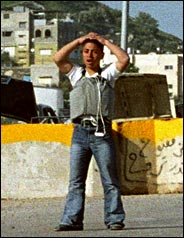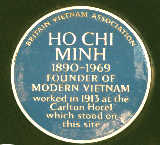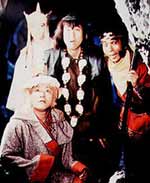Jim e-mails from Tehran with news of the gathering at Kaveh's grave to mark one year since he died.
He writes:
"It is still hard to believe what happened; it still has that element of unreality and disbelief about it.
"We had a little gathering up in Afjeh on Friday - though for Iranians, the anniversary was Thursday: It's a leap year, but the Iranian calendar doesn't add in the extra day till the end of the year so there's a one-day discrepancy because of the intrusion of 29 Feb. But because the Iranian day it happened - the 13th of Favardin, known as Sizda Bedar - is the day everybody has to get out of the house and have a picnic they did the commemoration on Friday anyway to avoid roads clogged by merry picnickers.
"There's been quite a lot of commemorative write-ups in the local papers. There was no ceremony or speeches, just people standing round and remembering. Kaveh was never much of a one for formalities."
Kav's family and friends laid flowers on his grave (which I visited myself in February) to mark the anniversary.
There's a one year on tribute to Kaveh here.
Saturday, April 03, 2004
Friday, April 02, 2004
HAPPY BIRTHDAY, MR STUMPY

At around this time, exactly one year ago, in a minefield in Northern Iraq, Mr Stumpy was born.
Today marks a year since I stepped on the landmine that changed my life. Technically, I suppose Mr S's birthday is on Tuesday, when the operation took place, but April 2nd is when it all started.
As I've written before, journalists love anniversaries -- 100 days in power, one year on from 9/11, 10 years since the Rwanda genocide. Because of this, I feel almost obliged to feel different today.
But I don't.
Over the past week I've been undecided whether it's a day for celebration or sadness.
It's a time for reflection on what happened to Kaveh, of course.
Mainly, though, today feels like just another day -- although not in a bad way.
My leg still hasn't grown back, which is a shame, but looking back on the year gone by so many wonderful things have happened, many of which wouldn't have occured had the accident not happened.
I've been able to draw attention to the landmine issue, to write and broadcast on the subject and to visit places like Cambodia. The support I've had from family and friends has been overwhelming.
One year on I'm walking, working as before and life goes on -- changed and even enriched rather than diminished by what happened. The fact that I don't feel any different today is a sign, I think, that the worst is over and that there's a bright future ahead.
So on balance I think it's a day to celebrate -- and this evening that's just what I'll do.
Discuss

At around this time, exactly one year ago, in a minefield in Northern Iraq, Mr Stumpy was born.
Today marks a year since I stepped on the landmine that changed my life. Technically, I suppose Mr S's birthday is on Tuesday, when the operation took place, but April 2nd is when it all started.
As I've written before, journalists love anniversaries -- 100 days in power, one year on from 9/11, 10 years since the Rwanda genocide. Because of this, I feel almost obliged to feel different today.
But I don't.
Over the past week I've been undecided whether it's a day for celebration or sadness.
It's a time for reflection on what happened to Kaveh, of course.
Mainly, though, today feels like just another day -- although not in a bad way.
My leg still hasn't grown back, which is a shame, but looking back on the year gone by so many wonderful things have happened, many of which wouldn't have occured had the accident not happened.
I've been able to draw attention to the landmine issue, to write and broadcast on the subject and to visit places like Cambodia. The support I've had from family and friends has been overwhelming.
One year on I'm walking, working as before and life goes on -- changed and even enriched rather than diminished by what happened. The fact that I don't feel any different today is a sign, I think, that the worst is over and that there's a bright future ahead.
So on balance I think it's a day to celebrate -- and this evening that's just what I'll do.
Discuss
Thursday, April 01, 2004
Another Iraq war survivor is getting the "One Year On" treatment -- former American POW Jessica Lynch.
Reflecting on the year gone by, the former Wirt County Miss Congeniality says: "I do want my life back to normal, because it's hard ? it's so hard. But at the same time I'm like ? wow, I get to go to New York, I get to go to Hollywood. I get to hang out with people like Britney and Leonardo."
Clearly, Jessica Lynch's life-changing experience has made her a deeper, more philosophical and more spiritual person.
Reflecting on the year gone by, the former Wirt County Miss Congeniality says: "I do want my life back to normal, because it's hard ? it's so hard. But at the same time I'm like ? wow, I get to go to New York, I get to go to Hollywood. I get to hang out with people like Britney and Leonardo."
Clearly, Jessica Lynch's life-changing experience has made her a deeper, more philosophical and more spiritual person.
From the prestigious page 39 of today's South Wales Echo, squeezed between Spot the Ball and the death notices....I'll let Alex have her own say on what she thinks about what the subs did to her copy.
It's a 1.6Mb pdf file:
South Wales Echo: The Fight Goes On For Stu
It's a 1.6Mb pdf file:
South Wales Echo: The Fight Goes On For Stu
Most of us think of refugee camps as bleak, temporary places made up of tents filled with wretched souls.
But doing some research for my proposed trip to Zambia and Angola it became clear that not all refugee camps are the same.
I'm hoping to visit the Meheba camp in northwestern Zambia. It was only when I read this report that I realised what a huge place it is.
It is, in effect, a town -- with more than 30,000 people living there, mud-brick houses, schools and its own system of self-government. It takes a hour to drive from one side to the other.
If I manage to get there, a key part of the story will be looking at how Angolan families who have spent most of their lives living in the camp in Zambia adapt on returning to a homeland many of them have never known.
But doing some research for my proposed trip to Zambia and Angola it became clear that not all refugee camps are the same.
I'm hoping to visit the Meheba camp in northwestern Zambia. It was only when I read this report that I realised what a huge place it is.
It is, in effect, a town -- with more than 30,000 people living there, mud-brick houses, schools and its own system of self-government. It takes a hour to drive from one side to the other.
If I manage to get there, a key part of the story will be looking at how Angolan families who have spent most of their lives living in the camp in Zambia adapt on returning to a homeland many of them have never known.

The Israeli government does itself absolutely no favours by accusing my colleague Orla Guerin of anti-semitism for daring to draw attention to the potential public relations advantage for Israel from the arrest last week of a teenage would-be suicide bomber.
The Israeli minister for diaspora affairs, Natan Sharansky, shows astounding dishonesty in claiming that Orla has "a deep-seated bias against Israel" because she noted that a child with learning difficulties had been paraded in front of the world's media. What Mr Sharansky doesn't make clear is that Hassam Abdu was presented to international reporters at the Hawara checkpoint near Nablus some hours after he was apprehended (Source: ABC News).
The day after Hassan Abdu was arrested, the New York Times outlined how events unfolded:
"In the propaganda battle that is always a component of the Middle East conflict, Israel is swift to highlight the Palestinian use of youths barely in their teens. In this case much of the drama was recorded by an Associated Press Television News cameraman, a Palestinian, who was among those waiting to cross the checkpoint....
"...As the rest of the story unfolded, it was captured on tape by the cameraman....
"...Israeli military and government officials immediately invited journalists to the scene and then placed Hussam on display for several minutes."
There are two points:
1) The BBC wasn't the only media outlet to draw attention to the way Hussam Abdu's capture was presented to the international media -- so why is the Corporation being singled out for criticism?
2) It is utterly ridiculous to claim that noting the fact that a child with learning difficulties was deliberately presented to journalists -- who were invited by press officers to the checkpoint -- shows anti-semitism and a "deep seated bias against Israel." Mr Sharansky's crying wolf routine seriously undermines the campaign against genuine anti-semitism, which is on the rise across Europe.
More troubling by far, though, is the call by some Israeli newspapers for the explusion of foreign reporters who didn't cover the story.
Criticising the foreign media is one thing -- but trying to interefere in their editorial decisions is another.
Meanwhile, there's much discussion in newsrooms over yesterday's "Mogadishu Moment" -- the graphic TV footage showing the mutilation of the bodies of four American contractors in Falluja.
My feeling is that in the right context, at a suitable time of day and preceded with a proper health warning, showing the pictures is justified (provided the next of kin of those killed have been informed.)
The danger, though, is that if the 24 hour news channels take graphic footage and repeat it time and time again as part of their non-stop coverage the pictures quickly lose their power to shock and become little more than wallpaper.
Discuss
Wednesday, March 31, 2004
From the website stats I see that someone at Cauldron Foods has been taking a look -- presumably drawn by my posting about their popularity in the BBC's Tehran bureau.
If the good people at Cauldron would like to send me a crate of veggie Lincolnshire sausages c/o BBC Television Centre I'll make sure they get to Iran.
If the good people at Cauldron would like to send me a crate of veggie Lincolnshire sausages c/o BBC Television Centre I'll make sure they get to Iran.

Lou calls with more news of Ho Chi Minh's Culinary London.
As well as toiling in the kitchens of the Drayton Court, he also worked as a chef in the former Carlton Hotel on the Haymarket in the centre of town.
It used to be a favourite dinner spot for politicians.
Apparently Ho Chi Minh was working there when Winston Churchill and David Lloyd-George, later prime minister himself, came to dinner at the outset of World War I.
The Carlton is now New Zealand House -- and the Uncle Ho connection is marked by a blue plaque on the wall.
The International Federation of Journalists issues a new call for international solidarity with journalists in Iraq:
IFJ: More Killings, Death Threats and Closure of Paper Deepen Iraq Media Crisis
IFJ: More Killings, Death Threats and Closure of Paper Deepen Iraq Media Crisis
Lynn e-mails with a link to a great piece by Wendell Steavenson about an English professor in Baghdad who collects the slogans scrawled onto the city's walls.
My favourites:
"SADDAM ATE BEANS AND EMITTED STINKY AIR"
"TURKEY AND IRAN ARE A SPLIT TURD"
"WOE FOR THE WINE SELLERS AND THE VENDORS OF NUDISM AND LIBERTINISM"
My favourites:
"SADDAM ATE BEANS AND EMITTED STINKY AIR"
"TURKEY AND IRAN ARE A SPLIT TURD"
"WOE FOR THE WINE SELLERS AND THE VENDORS OF NUDISM AND LIBERTINISM"
Tuesday, March 30, 2004
OI, UNCLE HO -- MINE'S A PINT, AND A HALF FOR THE LADY

Since I've moved house, my local is now the Drayton Court, just a short stagger from BNI Towers.
Someone once told me a great urban myth about the place but this evening I did some research and found out it's actually true.
In 1919, a Vietnamese man called Nguyen Van Thanh worked in the Drayton as a cook.
After adopting the name Ho Chi Minh, or "He Who Enlightens," he returned to Vietnam in 1941 and declared the nation's independence from France.
He led the Viet Minh independence movement in 1941, directed successful military actions against the Japanese occupation forces and later against the French bid to reoccupy the country and became President of the Democratic Republic of Vietnam (North Vietnam) in 1954.
I can't believe it. Ho Chi Minh worked in my local.
The Drayton also featured in the final story of the last season of Doctor Who to be made by the BBC.
Strange but apparently true.

Since I've moved house, my local is now the Drayton Court, just a short stagger from BNI Towers.
Someone once told me a great urban myth about the place but this evening I did some research and found out it's actually true.
In 1919, a Vietnamese man called Nguyen Van Thanh worked in the Drayton as a cook.
After adopting the name Ho Chi Minh, or "He Who Enlightens," he returned to Vietnam in 1941 and declared the nation's independence from France.
He led the Viet Minh independence movement in 1941, directed successful military actions against the Japanese occupation forces and later against the French bid to reoccupy the country and became President of the Democratic Republic of Vietnam (North Vietnam) in 1954.
I can't believe it. Ho Chi Minh worked in my local.
The Drayton also featured in the final story of the last season of Doctor Who to be made by the BBC.
Strange but apparently true.
FOX NEWS -- UNFAIR AND BOLLOCKS
"If the Americans go in and overthrow Saddam Hussein and it's clean, he has nothing, I will apologize to the nation, and I will not trust the Bush Administration again, all right?" -- Fox News's Bill O'Reilly, March 18th 2003.
Fox News's breathtakingly partisan and ill-informed reporting never ceases to amaze.
In Salon, David J. Sirota analyses the extent of the cosy relationship between Fox and the White House.
Sirota's conclusion: "Fox was an enthusiastic participant in the White House's campaign of disinformation leading the country into war."
Discuss
"If the Americans go in and overthrow Saddam Hussein and it's clean, he has nothing, I will apologize to the nation, and I will not trust the Bush Administration again, all right?" -- Fox News's Bill O'Reilly, March 18th 2003.
Fox News's breathtakingly partisan and ill-informed reporting never ceases to amaze.
In Salon, David J. Sirota analyses the extent of the cosy relationship between Fox and the White House.
Sirota's conclusion: "Fox was an enthusiastic participant in the White House's campaign of disinformation leading the country into war."
Discuss
NOT IN MY BACK YARD
Police say the threat in Britain from terrorism "remains very real" following the discovery of more than half a ton of ammonium nitrate fertiliser in a storage unit in west London.
I, however, am far more concerned about the threat to the value of my new house, considering it's about two miles from Hanwell, where the fertiliser was found.
Police say the threat in Britain from terrorism "remains very real" following the discovery of more than half a ton of ammonium nitrate fertiliser in a storage unit in west London.
I, however, am far more concerned about the threat to the value of my new house, considering it's about two miles from Hanwell, where the fertiliser was found.
As I suggested earlier this month, Alistair Cooke's decision to give up Letter From America was a clear sign that he was not long for the world.
BBC News: Broadcaster Cooke dies aged 95
Acting BBC director general Mark Byford said "Alistair Cooke was one of the greatest broadcasters ever in the history of the BBC" -- and few would disagree.
You can listen again to some of Cooke's most memorable despatches here.

In other media news, 13 episodes of the surreal 70s TV show Monkey have been found.
I remember watching it as a kid and it made no sense whatsoever but that doesn't seem to matter when you're 6 years old -- although I couldn't understand why Monkey et al kept insisting that Tripitaka was a bloke when she clearly wasn't.
BBC News: Broadcaster Cooke dies aged 95
Acting BBC director general Mark Byford said "Alistair Cooke was one of the greatest broadcasters ever in the history of the BBC" -- and few would disagree.
You can listen again to some of Cooke's most memorable despatches here.

In other media news, 13 episodes of the surreal 70s TV show Monkey have been found.
I remember watching it as a kid and it made no sense whatsoever but that doesn't seem to matter when you're 6 years old -- although I couldn't understand why Monkey et al kept insisting that Tripitaka was a bloke when she clearly wasn't.
Monday, March 29, 2004
Despite what Thomas Friedman says, the Lexus hasn't yet won out over the olive tree -- and the world's not as small a place as we may like to think.
This became abundantly clear today, when I began researching a possible assignment to Zambia and Angola.
The idea is to travel with the UNHCR and follow a family of Angolan refugees from the Meheba camp in western Zambia to Cazombo in eastern Angola and then on to their home villages, some of which have been cleared of landmines by MAG.
They're able to return thanks to a peace agreement signed last year, ending three decades of civil strife in Angola.
(There's a map of the camps here and more about the programme of returning refugees to Angola here.)
But the logistics involved are a nightmare. Dodgy internal flights, the prospect of travelling hundreds of kilometres along bad roads make this trip a difficult, if fascinating, proposition.
I hope we can pull it off.
This became abundantly clear today, when I began researching a possible assignment to Zambia and Angola.
The idea is to travel with the UNHCR and follow a family of Angolan refugees from the Meheba camp in western Zambia to Cazombo in eastern Angola and then on to their home villages, some of which have been cleared of landmines by MAG.
They're able to return thanks to a peace agreement signed last year, ending three decades of civil strife in Angola.
(There's a map of the camps here and more about the programme of returning refugees to Angola here.)
But the logistics involved are a nightmare. Dodgy internal flights, the prospect of travelling hundreds of kilometres along bad roads make this trip a difficult, if fascinating, proposition.
I hope we can pull it off.
Last September I wrote about the Channel 4 documentary "A Tale of Two Alis," which contrasted the fates of two Iraqi boys injured during the war.
Ali Abbas was offered lucrative media exclusive deals and received medical treatment in the UK, while Ali Hussein returned to an uncertain future in Iraq.
The charity Facing The World read what I wrote and have been in touch with some good news.
They say:
"Ali has in fact received the reconstructive surgery that he needs (although he will need further surgery when he is 16 and finishes growing).
"He is in London at the moment awaiting the second part of his procedure and the fitting of his prosthetic eye and will return home with his father (who accompanied him) back to Iraq in mid April.
"Sadly, of course, the family farm is still unworkable as it is littered with unexploded bombs left over from the attack that injured Ali and killed so many of his family. Hopefully in due course we will be able to highlight the need to have these safely removed.
"Facing the World is a relatively new craniofacial and facial reconstruction charity who offer surgery to children with severe disfigurements who are unable to receive treatment in their own countries. There are - as you mentioned - so many children in Iraq still needing assistance who we would desperately love to help."
Details of how to help are on the Facing The World website.
Ali Abbas was offered lucrative media exclusive deals and received medical treatment in the UK, while Ali Hussein returned to an uncertain future in Iraq.
The charity Facing The World read what I wrote and have been in touch with some good news.
They say:
"Ali has in fact received the reconstructive surgery that he needs (although he will need further surgery when he is 16 and finishes growing).
"He is in London at the moment awaiting the second part of his procedure and the fitting of his prosthetic eye and will return home with his father (who accompanied him) back to Iraq in mid April.
"Sadly, of course, the family farm is still unworkable as it is littered with unexploded bombs left over from the attack that injured Ali and killed so many of his family. Hopefully in due course we will be able to highlight the need to have these safely removed.
"Facing the World is a relatively new craniofacial and facial reconstruction charity who offer surgery to children with severe disfigurements who are unable to receive treatment in their own countries. There are - as you mentioned - so many children in Iraq still needing assistance who we would desperately love to help."
Details of how to help are on the Facing The World website.





